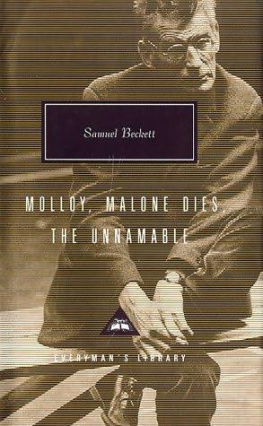The Grove Companion
to
Samuel Beckett
The Grove Companion
to Samuel Beckett
A Readers Guide
to His Works, Life, and Thought
C. J. Ackerley
and
S. E. Gontarski

Copyright 2004 by C. J. Ackerley and S. E. Gontarski
All rights reserved. No part of this book may be reproduced in any form or by any electronic or mechanical means, including information storage and retrieval systems, without permission in writing from the publisher, except by a reviewer, who may quote brief passages in a review. Any members of educational institutions wishing to photocopy part or all of the work for classroom use, or publishers who would like to obtain permission to include the work in an anthology, should send their inquiries to Grove/Atlantic, Inc., 841 Broadway, New York, NY 10003.
Published simultaneously in Canada
Printed in the United States of America
FIRST EDITION
Library of Congress Cataloging-in-Publication Data
Ackerley, Chris, 1947
The Grove companion to Samuel Beckett : a readers guide to his works, life, and thought / C. J. Ackerley & S. E. Gontarski. 1st ed.
p. cm.
eBook ISBN-13: 978-0-8021-9980-5
1. Beckett, Samuel, 1906Dictionaries. 2. Authors, Irish20th centuryBiographyDictionaries. 3. Authors, French20th centuryBiographyDictionaires. I. Title: Companion to Samuel Beckett. II. Gontarski, S. E. III. Title.
PR6003 .E282Z459 2004
848 .91409dc22 2003064617
Grove Press
841 Broadway
New York, NY 10003
For Marsha, who makes the wheels turn,
And for Elisabeth, with love and appreciation
Contents
Introduction:
Anywhere and Nowhere:
Mapping the Beckett Country
What I am looking for is nowhere, as far as I can see.
Belacqua Shuah, More Pricks Than Kicks
Strictly speaking I believe Ive never been anywhere.
The End
You and your landscapes! Tell me about the worms!
Estragon, Waiting for Godot
to hell with all this fucking scenery.
Malone
A paradox lies at the core of Samuel Becketts creative enterprise. Arguably the preeminent avant-garde writing of the post-World War II era, a period we loosely call postmodern, Becketts work is equally the culmination of the Romantic agony; he is at once the emblematic deconstructive author and the heir to Kant and Schopenhauer (despite their emphasis on the phenomenal world), if not to Hume. In other words, his celebrated innovation and his assault on literary convention are themselves rooted in discernible literary and cultural traditions, as much pre- as postmodern, his sensibility reaching back to the classicalthat classicism leavened by both late Romanticism and post-humanism. His celebrated aporia finally may be as rooted in pre-Socratic as in poststructuralist thought.
One useful starting point for reading Beckett, then, may be Becketts own reading, particularly those works he read as he struggled to invent himself as a writer, among them: William Inges Christian Mysticism (1899); John Burnets Early Greek Philosophy (1892) and Greek Philosophy (1914); Robert Burtons The Anatomy of Melancholy (1621); Mario Prazs The Romantic Agony (1930); and Wilhelm Windelbands A History of Philosophy (1892 and 1900). The ghostly, disembodied, externalized voices of Becketts late fiction and drama, arguably his most profound literary creations, derive initially if not primarily from the myth of Echo and Narcissus. (The electronic projection of the disembodied voice developed by Marconi and the internal discourse of fragmented Jungian or Lacanian ego thus are afterthoughts.) His ontology, a sense of discontinuous being or lack of fixity of any sort, owes as much to the contretemps between Heraclitus and Parmenides as it does to post-Freudian psychoanalysis. Heraclituss emphasis on a world of becoming, a liminal world in perpetual transition, reverberates through Becketts work where to utter now is always late, an afterthought, consciousness itself always belated. To utter I, then, is inescapably retrospective, a corrupt distortion of memory, nostalgia for a present moment, as Kant suggested, always inaccessible to empirical consciousness. Moreover, while the cultural dislocation, alienation, and the dehumanization of the Shoah that blight the twentieth century dominate his art, it retains a remarkable if surprising coherence, his works forming part of a continuous series, if not a pattern.
As early as 14 May 1947, for example, in the midst of an explosive creative period he called the siege in the room, Beckett detailed that continuity to friend and sometime literary agent George Reavey. Of Watt in particular he confessed, It has its place in the series, as will perhaps appear in time; and on 8 July 1948 he elaborated on that design: I am now typing, for rejection by the publishers, Malone meurt, the last I hope of the series Murphy, Watt, Mercier & Camier, Molloy, not to mention the 4 Nouvelles & Eleutheria (Lake, 53). Malone meurt was, of course, not the end, the series (progressive or regressive) merely slowed by the authors corporeal demise in December of 1989, Beckett apparently still publishing from au del: Dream of Fair to Middling Women in 1992, Eleutheria in 1995, as well as a series of notebooks and letters, all of which begin to constitute something like a gray canon of his work.
Throughout that series his creatures peopled what critics began to recognize as a distinct terrain, the Beckett country. It is a premodern world where bicycles outnumber motorcars, where theaters are lit by footlights, where clothes are fastened by buttonhooks, where parents still pass on family greatcoats and bowler hats to their offspring, hats tethered to coatsa world of chamber pots, which put humanity in greater proximity to evacuation, and oil lamps. Becketts roots reside firmly in turn-of-the-century turf, amid the Anglo-Irish bourgeoisie. It is a propertied world, where possession assured not only propriety but existence as well, a world whose dictum may have been, I own, therefore I am. The residue of that tradition remains traceable in Becketts work, the Ascendancy Big House having become Gothic in Watt and Footfalls. Becketts creatures retain a curious, antibourgeois relationship to possessions or property, of course. They simultaneously seem obsessed by and strangely neglegent of them or it.
Becketts critique of that tradition includes the treatment of the body as possession, property about which his characters are often as careless as they are about their other chattels. As in much eighteenth- or nineteenth-century fiction, Becketts characters are often expelled from a world of consequence, and thus become inconsequential. Beckett played with that materialist tradition, like Mr. Kelley and his kite, to the point of immateriality, his characters dispossessed of their property and the ownership of their bodies, hence the emergence of ghostlike, neo-Gothic figures like May in Footfalls and her unnamed echo in Ill Seen III Said. The issues of property, of possession and dispossession, thus shift to the subjectivity of being. If one is defined by ones things, Becketts characters slip or are pushed into a world of no thing, an immaterial world where even language, ones narrative voice, or its physical manifestation in writing, are beyond possession.
Beckett finally rejected bourgeois Dublin for bohemian Paris, there championing the antifigurative painting of intimates like the brothers van Velde, Bram and Geer. His own art, however, reflects less such priestly moderns than figurative painters who might have been perfectly acceptable to Dublins Anglo-Irish Ascendancy: Rembrandt, Caravaggio, and, perhaps most important, the German Romantic Caspar David Friedrich, one version of whose
Next page


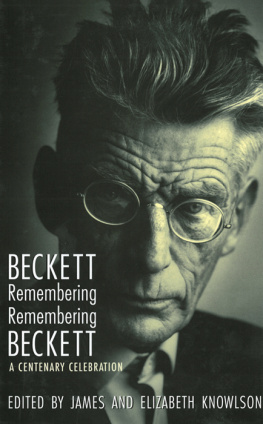
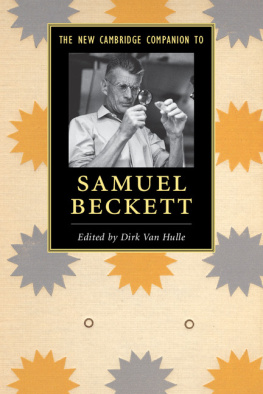
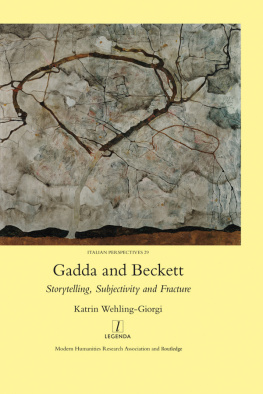
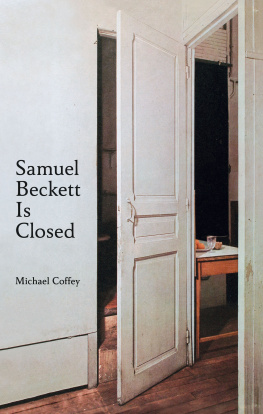
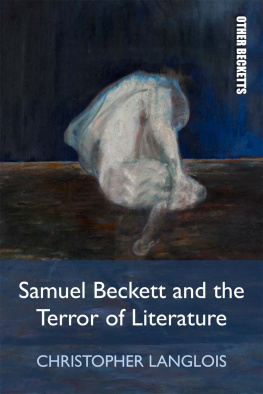
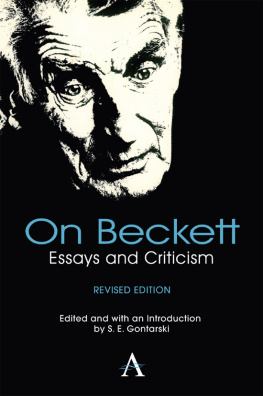
![Samuel Beckett [Samuel Beckett] - The Complete Dramatic Works](/uploads/posts/book/72751/thumbs/samuel-beckett-samuel-beckett-the-complete.jpg)
